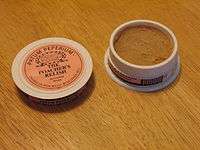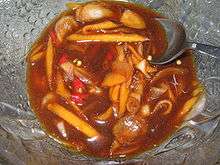Gentleman's Relish
Gentleman's Relish is a type of anchovy paste. It is also known as Patum Peperium (in the style of Latin). It was created in 1828 by an Englishman named John Osborn.[1] It has a strong, very salty and slightly fishy taste, and contains anchovies (minimum 60%), butter, herbs and spices. Today, the secret recipe is withheld from all but one employee at Elsenham Quality Foods in Elsenham, England, the licensed manufacturer.[1][2]

Uses
Gentleman's Relish is traditionally eaten thinly spread on slices of buttered white-bread toast, either on its own, or with cucumber or "mustard and cress" sprouts. It can also be added to minced meat for a different-tasting cottage pie or to the mixture for fish cakes, potato cakes and croquettes. Alternatively it can be melted into scrambled eggs or be used as a topping for jacket potatoes.[3] It is an ingredient in the dish Scotch woodcock.
Variations

Elsenham Quality Foods also make a similarly packaged product, Poacher's Relish, made from smoked salmon, butter, spices and lemon zest.[4] The relish is sold in plastic containers (pictured), and in more expensive but reusable traditional ceramic pots.[5] Since 2008 another variation, Angler's Relish, made from smoked mackerel, salted butter, lemon juice, vinegar, spices and other ingredients was introduced in commemorative packaging to mark the 180th anniversary of John Osborn's creation. Both are also usually eaten on toast or savoury biscuits.
References
- Gentleman's Relish: And Other English Culinary Oddities (A Gourmet's Guide). Warrington: National Trust Books (Anova Books). 2007. pp. 12–13. ISBN 1-905400-55-1. Retrieved November 3, 2017.
- "Spreading the word". The Guardian. 18 February 2001. Retrieved 16 January 2017.
- "19 USES FOR GENTLEMAN'S RELISH (PATUM PEPERIUM)". foodzube. Retrieved 16 January 2017.
- "Gentleman's Relish Patum Peperium". Find.Eat.Drink. 10 January 2010. Retrieved 16 January 2017.
- Roddy, R. (2017). Two Kitchens: Family Recipes from Sicily and Rome. Headline. p. pt444. ISBN 978-1-4722-4842-8. Retrieved January 29, 2018.
External links
- The height of good paste The Telegraph, 28 December 2000.
